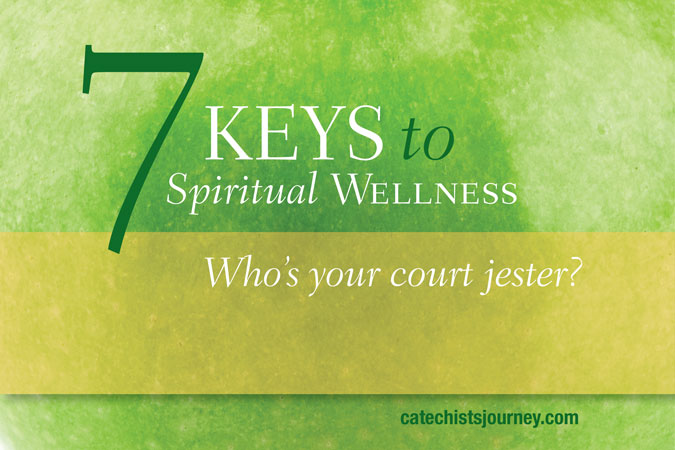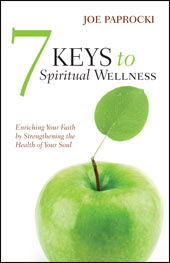
Editor’s note: Today we start a series inspired by Joe Paprocki’s book 7 Keys to Spiritual Wellness. In the book, Joe introduces each key with a fun or thought-provoking question. Each Friday we’ll share an excerpt from 7 Keys to Spiritual Wellness that poses a question, followed by a response by a catechist or catechetical leader. Today, Bob Burnham, catechist and author of Little Lessons from the Saints, responds to the first question. We invite you to respond in the comments section.
Who’s your court jester?
Everyone needs a court jester. And I’m not just talking about someone who can make you laugh. I mean someone who can make you laugh at yourself. In medieval monarchies, the court jester was more than a mere buffoon; he was a voice of common sense, insight, and honesty—often brutal honesty, as in “the truth hurts.” He was the only person in the monarch’s court who had license to mock the monarch, usually to reveal the folly of his or her majesty’s ways…
So I ask again, who’s your court jester? Who can get away with it because you know they love you? Who gets to reveal the folly of your ways and still receive an invitation to dinner? Perhaps it’s a spouse, a sibling, one of your own children, a friend, or coworker. Without a court jester, we run the risk of believing the hype about ourselves. Without a court jester, we run the risk of not being able to attain a true and healthy self-image. And without a healthy self-image, our spiritual wellness is in jeopardy.
Achieving a healthy self-perception can seem as precarious as walking on a tightrope—it is a matter of balance. On the one hand, we are made in the image and likeness of God, and the affirmations we receive in life can help us to recognize our family resemblance to God. On the other hand, we are not God. We simply resemble God. And so our challenge is to find a balance that gives us a healthy self-esteem. Without balance, we run the risk of developing a distorted sense of self that can ultimately skew our perception of reality, including how we perceive others and God. Our quest is to be authentic—to see ourselves as we really are.
—7 Keys to Spiritual Wellness by Joe Paprocki
The Gift of Having My Own Court Jester

I was talking to my good friend Kathy recently. “So, Bob, what’s on the agenda for the weekend?” she asked.
“I’m going on a silent retreat.”
She erupted with laughter. “You?!?! How’s that going to work?”
“Well, it’s part of—” I tried explaining.
“You always have something to say,” she snorted, “even when there’s no one’s around!”
“Ha, ha, very funny.” I waited for her laughter to subside. “You know, I’ve done this—”
“Dude, seriously,” she said, catching her breath, “you don’t know how many times I wish you’d shut up!”
I soon found that I was laughing with her. She was, after all, my court jester.
Over the years, I have come to trust Kathy. We worked side-by-side for years, facing challenging projects, schedules, clients, and bosses. As we learned to rely on each other as coworkers, we also discovered that we could rely on each other as friends. This friendship has continued to flourish, even though our career tracks have long since diverged.
I know that her friendly teasing—which is not always gentle, but always good-spirited—is a precious gift: she helps me laugh at myself. Whenever I am feeling self-important or prideful, Kathy will say something that will put me in my place. She reminds me that I am nothing special—I am unique, yes; I am loved, absolutely. Like everyone else, I am trying to do my best in a world that is too often unreasonable, unforgiving, and uncaring. By teaching me that, Kathy helps me be a person of compassion, someone who can love his neighbors as himself.
My court jester teaches me that it is OK to laugh at myself. When I do, I get a glimpse of the person God created; I am reminded that I am a person who likes to laugh and who likes to spread cheer to others. Seriousness is not in my nature. (Though, I can trust that my court jester will remind me when I need to approach things with greater earnest.) And I like to think laughing at myself is something I have in common with God, who I assume laughs to himself, saying, “Oh, Bob . . .”
Perhaps that’s why I love my court jesters—all of them—and why they are so important: they can be our teachers. They teach us that we are not the center of the universe. They teach us to see beyond our narrow perspectives. They teach us to see our own imperfections without shaming us. We expect our court jesters to be honest with us, and upon that honesty we build trust. Our court jesters can be our most intimate friends.
I don’t know where I’d be without mine.

Get the book that inspired this series! Purchase 7 Keys to Spiritual Wellness by Joe Paprocki at LoyolaPress.com.



Who is my court jester? Children and grandchildren are very observant , they can imitate better than others, over exaggerating mannerisms , gait and expressions. Am I really like that? Well, yes, I am. I come to know myself through those close to me.
My court jesters are my three best friends, Peter, Grace and Imma, they help me get through so may things and be kind to myself. They also make me stay humble. They are truly a blessing in my life. I love them!